Durant: Being a superstar is about performance, not the title. I want to keep playing until I physically can’t anymore.
On October 20th Beijing time, the countdown to the Rockets’ season opener has begun, and the Houston Chronicle provided an analysis of the partnership between the Rockets and Durant, with the main points as follows—
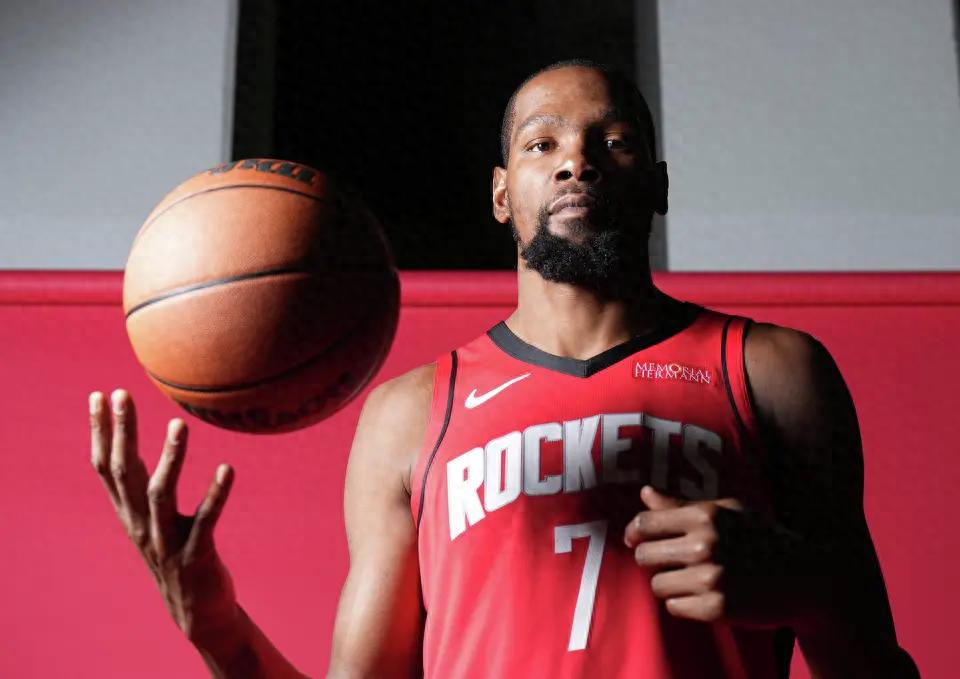
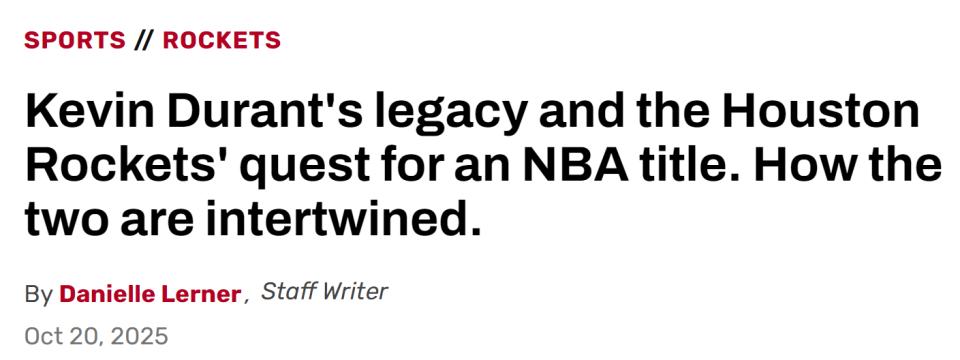
Head coach Udoka firmly stated,the Rockets do not want to lose their unique style by turning into a “Durant-centric” team, and Durant also insists he only wants to be one member of the group. So, what do the Rockets need Durant to do, and what does Durant need from the Rockets? The first question is easier to answer than the second.
The Rockets’ biggest weakness was exposed in last season’s playoffs: a lack of clutch scorers in stagnant half-court offense, which perfectly matches Durant’s strengths. At 37, Durant is still considered one of the best isolation scorers in NBA history. Defensively, his height and switchability align well with Houston’s system priorities.
The torn ACL of Rockets’ point guard VanVleet may require Durant to take on more playmaking responsibilities than initially expected, even though Udoka promotes a “collective offensive organization” approach, which also involves Amen, Shepard, and Shengelia.
The Rockets are still figuring out each player’s role on offense, and Durant mentioned this process might take weeks or even months. Meanwhile, his impact on the younger players is already evident.
“The best thing I’ve learned from KD is his work ethic,” Amen Thompson said. “Sometimes I think I’m working hard, but then you see KD—he’s almost 40 and works harder than me, super hard.”
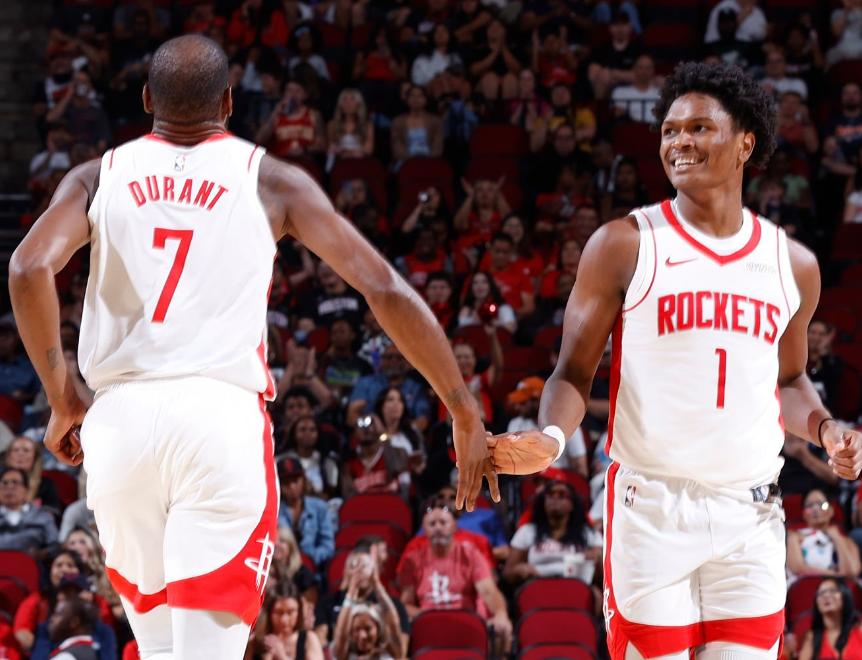
There are some doubts about Durant’s durability (he played 62 games last season) and the organizational gap left by VanVleet. But the Rockets have already tasted the playoffs, retained most of their rotation, and added a superstar scorer. So why shouldn’t they be considered one of the favorites to win the championship?
“I believe the Rockets’ expectation should be a championship,” said Rockets forward Jabari Smith Jr. “I think everyone here, everyone on the team, feels we have what it takes to achieve that, and that’s not something to be vague about. That’s what you want to express... We feel ready.”
On-court fit is only one reason Durant wanted to join the Rockets.
He came to Houston partly because of his connections. Durant previously played with current Rockets teammates Jeff Green, Adams, and Okogie on other NBA teams. Udoka coached him on the national team and with the Nets. Rockets assistant coach Royal Ivey, one of Durant’s closest friends, also coached with the Nets and played at Texas a few years before Durant. Two of Durant’s college teammates, Augustine and Pittman, currently work with the Rockets as scouts and in basketball operations.
If the Rockets are a web, Durant is the key presence at its center. Durant said walking into the Rockets’ home arena felt “natural and logical.”
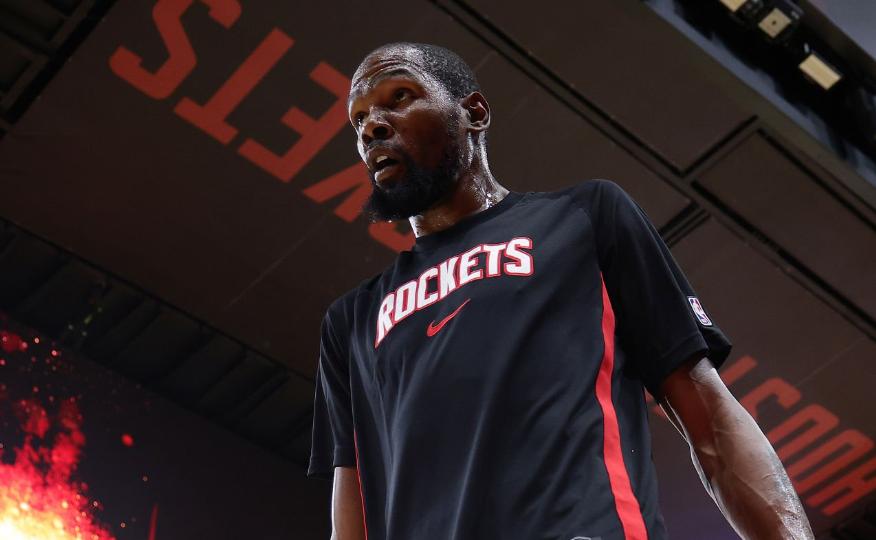
Durant said that early in his career, he valued achievements over relationships as a measure of success, but that’s no longer the case. Of course, he wants another NBA championship ring and believes the Rockets have what it takes to win. But in the twilight of his career, he’s not chasing anything.
“I feel as I get older, I just want to keep going, like I said before, I enjoy improving and refining my skills,” he said. “You can’t do anything without the people around you. When we were young, we were taught it’s all about yourself, but when you play on a team, you realize it’s much bigger than yourself. That’s the motivation behind it all. I just want to do incredible things with great people.”
Over the years, Durant has faced frequent criticism, much of it from those unhappy with his decisions to move from one team to another. His social media “provocations” are as famous as his step-back mid-range jumper.
Durant does care about what people think of him, but he doesn’t try to change their opinions.
“In a way, it doesn’t keep me up at night. No, I don’t care, but I hear it,” he said. “I think hearing what others say and caring are two different things. I don’t want to come off as a cold person, emotionless, uncaring, unthinking, without deep conscience. But many things I’ve learned to ignore and understand that people want to be like me, want to be in my position, want to have the passion I have.”
Okogie, who played alongside Durant for three seasons in Phoenix, said Durant’s confidence is one of the reasons he consistently performs at a high level on the court.
“Kevin is Kevin, and we play around him,” Okogie said. “He’s such an outstanding offensive player. I think it’s impossible to score over 30,000 points without knowing what to do. So he definitely knows what he’s doing, and he adapts well to any offensive style. I’m sure we’ll let him be himself.”
Are the Rockets just one superstar away from an NBA championship? In the last 20 years, every championship team and most teams in NBA history had at least one superstar. Durant agrees that superstars are traditionally essential for winning, but it depends entirely on how one defines a superstar subjectively.
“I believe being a superstar isn’t about the title but about your performance,” Durant said. “For example, Jamal Murray isn’t considered a superstar, but did he have a superstar-level Finals run? Yes... I think the beauty of the game is that everyone has the potential to reach superstar status. It’s just about consistency and maintaining that level.”
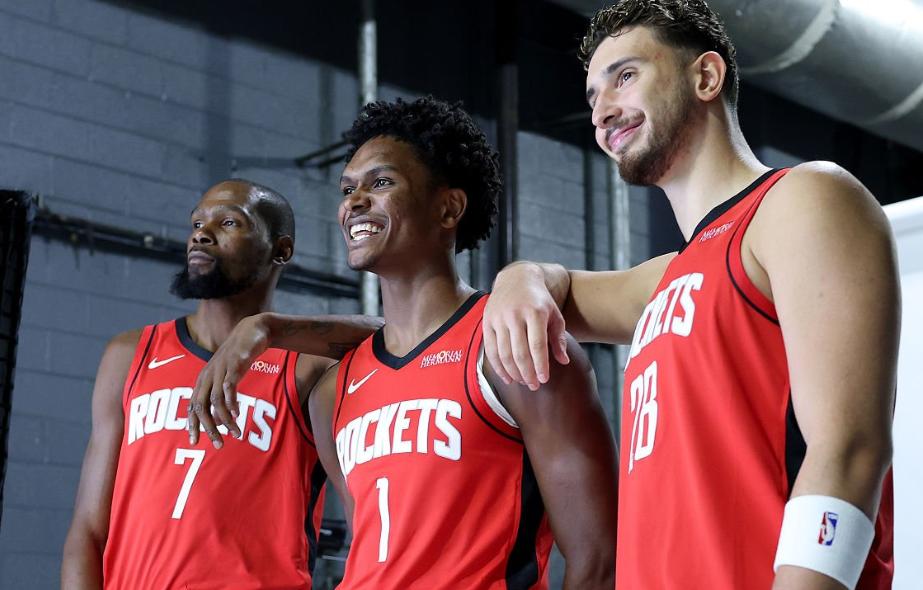
On the Rockets, Durant’s “big three” teammates are center Shengelia and wing Amen Thompson. Shengelia is a Nikola Jokic-style skilled passer who made his first All-Star appearance last season and won a silver medal at the European Championship during this offseason. Amen Thompson is a defensive powerhouse, voted by NBA general managers this fall as the player most likely to have a breakout season.
This season, both will have to adapt to higher usage roles, with Shengelia as the offensive focal point and Thompson as the ball-handler and primary playmaker.
“These guys are only 22, 23 years old; when I was 23, 22, I didn’t even know what fit me,” Durant said. “But you already see their great flashes.You see flashes of potential and consistency. You have talent and production. So the question is, how do you maintain that level every day, and that’s the hidden challenge for professional players. You can have a great game, a great season, a great stretch, but can you perform at that level every time you step on the court? That’s what we’re all trying to build as players.”
Durant is determined to stay with the team beyond this season. His contract extension pays him $30 million less than the max, giving the Rockets extra salary cap flexibility, which they need after re-signing Smith this summer and with Ethan and Thompson eligible for upcoming extensions. Durant’s extension does include a player option for the 2027-28 season.
But Durant does not shy away from saying he wants to finish his career with the Rockets, even though he’s tired of hearing retirement talk.
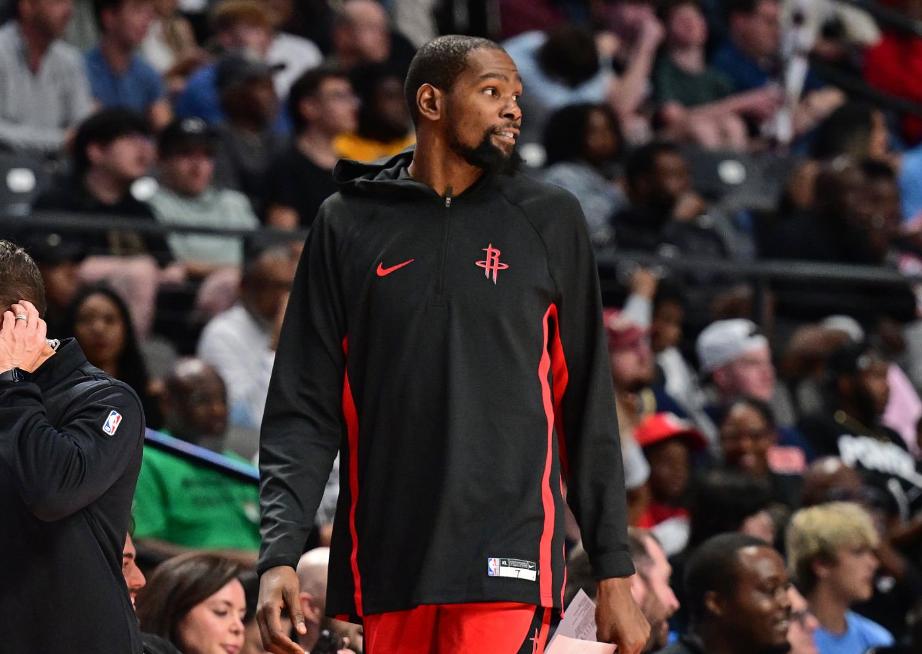
“I just want to keep playing until I physically can’t anymore,man. Whenever that time comes, it comes,” he said. “When you dedicate your whole life to this sport, you wonder what it’s like to live like a normal person, you know, living life at that pace. But most of the time, I love what I do. I love being immersed in the NBA and basketball, and I don’t want it to end.”


Wonderfulshortvideo
LeBron’s Dunk had the crowd noise break the MIC


Wemby is COOKING with the new look 🎯


What a play by the rook 🐝


Tough bucket here by Cade 🔥


Some @New York Knicks legends are courtside tonight 🔥


This is wholesome 🥹


Jaylen Brown is on a tear tonight 🤯








 Links
Links
 Contact
Contact
 App
App


